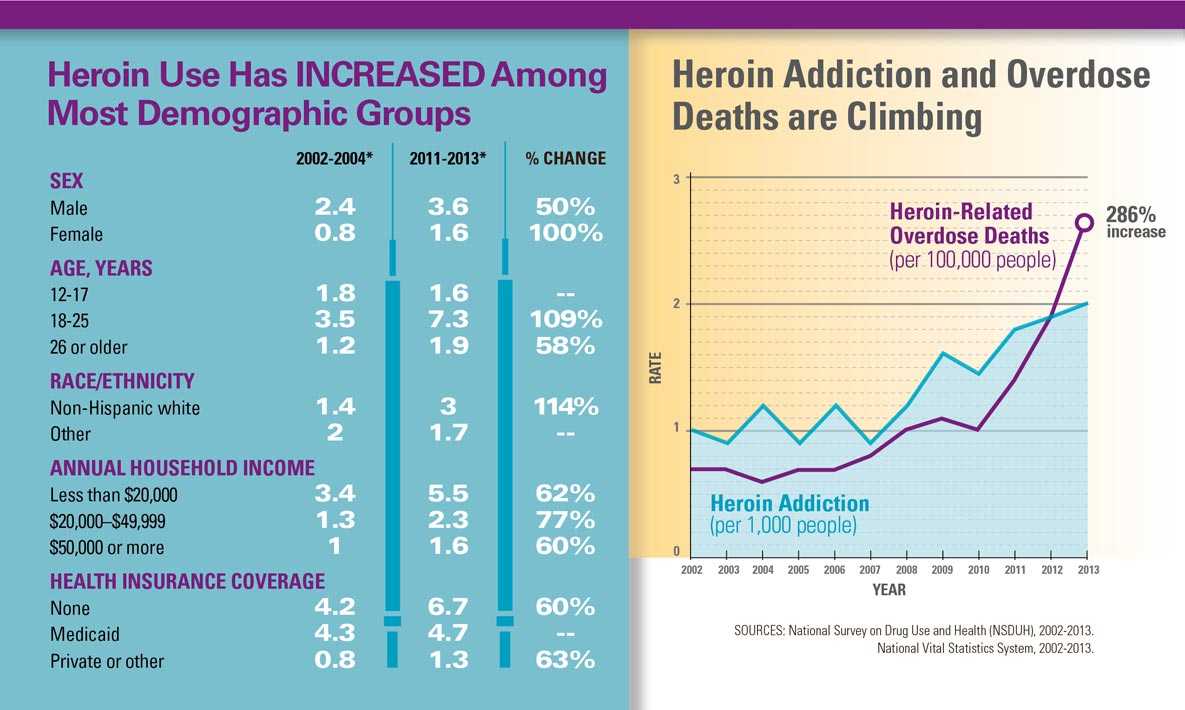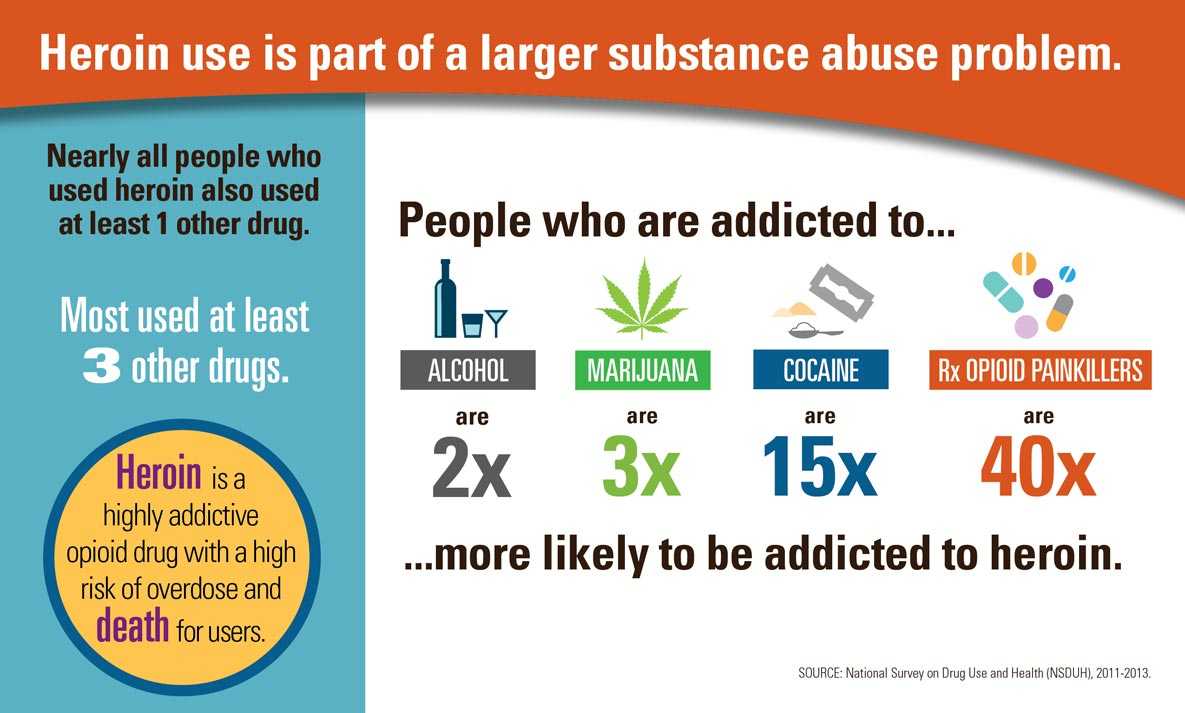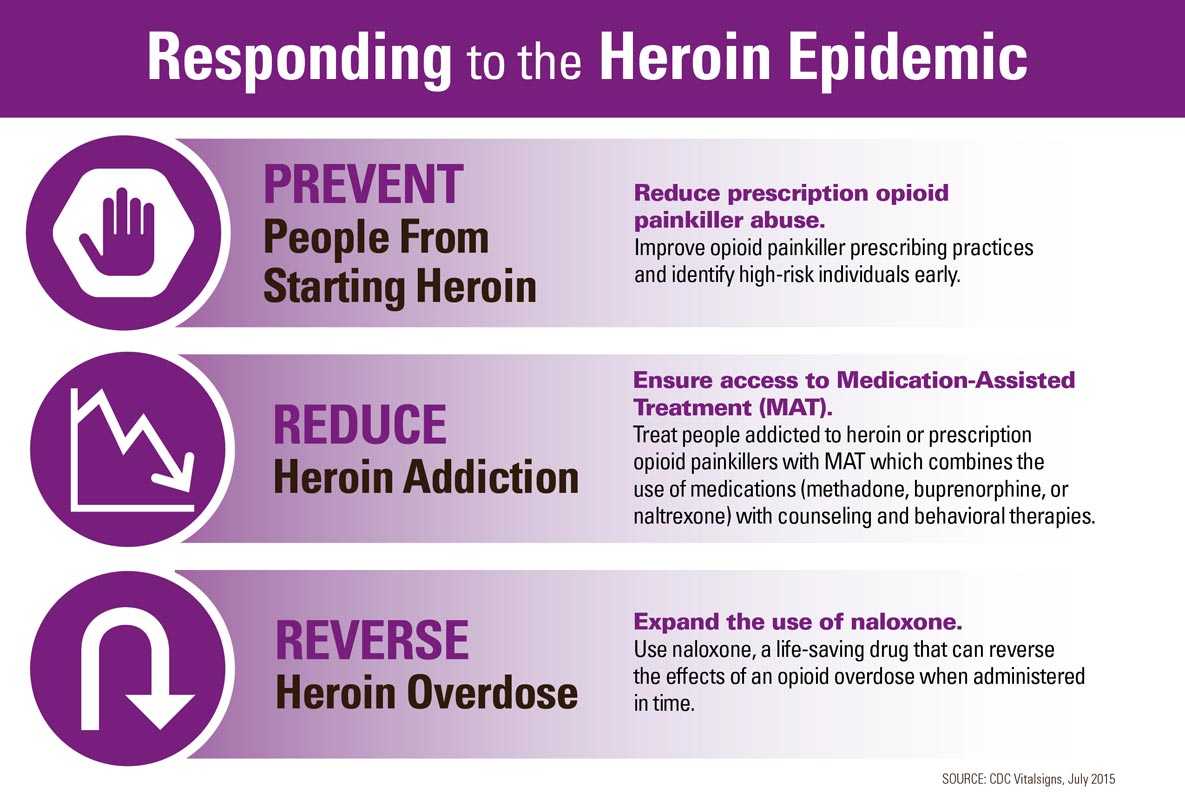Today’s Heroin Epidemic Infographics
More people at risk, multiple drugs abused

Heroin Use Has INCREASED Among Most Demographic Groups
Heroin use has increased among most demographic groups. This chart shows the annual average rate of heroin use (per 1,000 people in each demographic group) for the combined years 2002 to 2004 and 2011 to 2013, and shows the percent increase between those time periods.
| 2002–2004* | 2011–2013* | Percent Change | |
|---|---|---|---|
| Sex | |||
| Male | 2.4 | 3.6 | 50% |
| Female | 0.8 | 1.6 | 100% |
| Age, Years | |||
| 12–17 | 1.8 | 1.6 | — |
| 18–25 | 3.5 | 7.3 | 109% |
| 26 or older | 1.2 | 1.9 | 58% |
| Race / Ethnicity | |||
| Non-Hispanic white | 1.4 | 3 | 114% |
| Other | 2 | 1.7 | — |
| Annual Household Income | |||
| Less than $20,000 | 3.4 | 5.5 | 62% |
| $20,000–$49,999 | 1.3 | 2.3 | 77% |
| $50,000 or more | 1 | 1.6 | 60% |
| Health Insurance Coverage | |||
| None | 4.2 | 6.7 | 60% |
| Medicaid | 4.3 | 4.7 | — |
| Private or other | 0.8 | 1.3 | 63% |
*Annual average rate of heroin use (per 1,000 people in each group)
Heroin Addiction and Overdose Deaths are Climbing
Heroin addiction and overdose deaths are climbing. The x-axis category is years and runs from 2002 to 2013. The y-axis category is rate and runs from 0 to 3. The rates of heroin addiction and heroin-related overdose deaths are given in the table below. The heroin-related overdose death rate increased 286% from 2002 to 2013.
| Year | Heroin Addiction (per 1,000 people) | Heroin-Related Overdose Deaths (per 100,000 people) |
|---|---|---|
|
2002 |
1.0 |
0.7 |
|
2003 |
0.9 |
0.7 |
|
2004 |
1.2 |
0.6 |
|
2005 |
0.9 |
0.7 |
|
2006 |
1.2 |
0.7 |
|
2007 |
0.9 |
0.8 |
|
2008 |
1.2 |
1.0 |
|
2009 |
1.6 |
1.1 |
|
2010 |
1.4 |
1.0 |
|
2011 |
1.8 |
1.4 |
|
2012 |
1.9 |
1.9 |
|
2013 |
2.0 |
2.7 |
SOURCE: National Survey on Drug Use and Health (NSDUH), 2002-2013.
SOURCE: Multiple Cause of Death Files from the National Vital Statistics System, 2002-2013.

Heroin use is part of a larger substance abuse problem.
Nearly all people who used heroin also used at least 1 other drug. Most used at least 3 other drugs.
Heroin is a highly addictive opioid drug with a high risk of overdose and death for users.
People who are addicted to…
Alcohol are 2 times more likely to become addicted to heroin.
Marijuana are 3 times more likely to become addicted to heroin.
Cocaine are 15 times more likely to become addicted to heroin..
Prescription opioid painkillers are 40 times more likely to become addicted to heroin.
SOURCE: National Survey on Drug Use and Health (NSDUH), 2011-2013.

Responding to the Heroin Epidemic
- Hand up icon, indicating a command to stop
- PREVENT People From Starting Heroin
- Reduce prescription opioid painkiller abuse.
- Improve opioid painkiller prescribing practices and identify high-risk individuals early.
- PREVENT People From Starting Heroin
- Decreasing line graph icon
- REDUCE Heroin Addiction
- Ensure access to Medication-Assisted Treatment (MAT).
- Treat people addicted to heroin or prescription opioid painkillers with MAT which combines the use of medications (methadone, buprenorphine, or naltrexone) with counseling and behavioral therapies.
- REDUCE Heroin Addiction
- U-turn icon
- REVERSE Heroin Overdose
- Expand the use of naloxone.
- Use naloxone, a life-saving drug that can reverse the effects of an opioid overdose when administered in time.
- REVERSE Heroin Overdose
SOURCE: CDC Vitalsigns, July 2015
- Page last reviewed: July 7, 2015
- Page last updated: July 7, 2015
- Content source:
Error processing SSI file


 ShareCompartir
ShareCompartir